For 135 years, Salvationists around the world have come together to raise money in support of the international Salvation Army through the Self-Denial Campaign, also referred to as Partners in Mission. According to the Oxford Dictionary, self-denial is “the denial of one’s own interests and needs; self-sacrifice.” Every territory, command and region participate in this campaign, but self-denial is different for everyone. That’s why we reached out to Salvationists to ask, “What does self-denial mean to you?”
Canada and Bermuda Territory
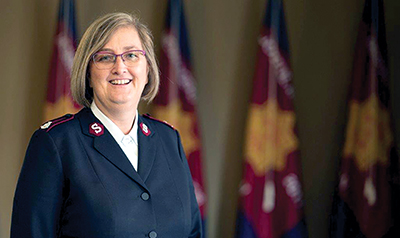
For me, self-denial is a lifestyle I try to choose every day as a follower of Jesus. My desire is to follow Jesus’ example when he said to his father, “Not my will, but yours be done” (Luke 22:42). I choose to say “yes” to what the Lord has for me, instead of what I want, desire or think is best for me. Surrendering to his plans, his ways, his leading is not always easy, but my experience has shown that as I live this way, it brings contentment and much joy.—Major Elizabeth Nelson, officer personnel secretary
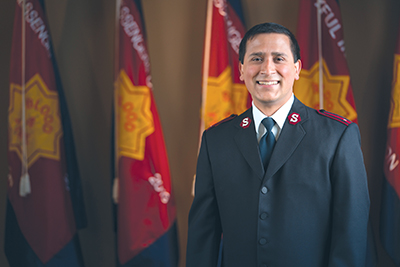 As a child, I wasn’t sure if the $2 or $3 I offered to the Self-Denial Campaign in Chile was going to change anybody’s life, but even then, I still felt like I was part of something much bigger. For me, self-denial means thinking about others—it’s a time to stop thinking about yourself, and to realize the importance of everyone else. When I think of self-denial, I am reminded of the words of Jesus in Matthew 25:40: “The king will reply, ‘Truly I tell you, whatever you did for one of the least of these brothers and sisters of mine, you did for me.’ ”—Lieutenant (Dr.) Marco Herrera Lopizic, territorial director for health services and associate development officer, Papua New Guinea and Solomon Islands Tty
As a child, I wasn’t sure if the $2 or $3 I offered to the Self-Denial Campaign in Chile was going to change anybody’s life, but even then, I still felt like I was part of something much bigger. For me, self-denial means thinking about others—it’s a time to stop thinking about yourself, and to realize the importance of everyone else. When I think of self-denial, I am reminded of the words of Jesus in Matthew 25:40: “The king will reply, ‘Truly I tell you, whatever you did for one of the least of these brothers and sisters of mine, you did for me.’ ”—Lieutenant (Dr.) Marco Herrera Lopizic, territorial director for health services and associate development officer, Papua New Guinea and Solomon Islands Tty
Liberia and Sierra Leone Command
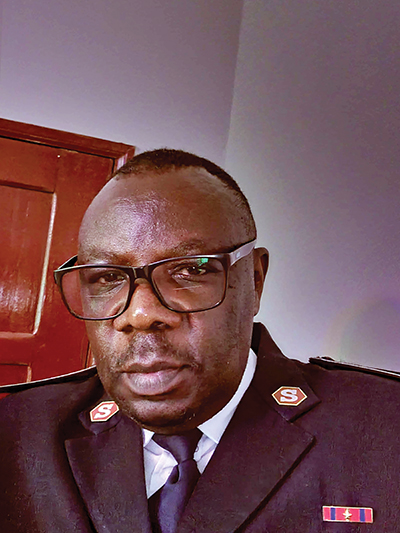 “Then Jesus said to his disciples,‘Whoever wants to be my disciple must deny themselves and take up their cross and follow me’ ”(Matthew 16:24). Here, Jesus gives the principle of self-denial. The principle is to forget yourself, carry the cross and follow Jesus. To me, self-denial is the act of forsaking what’s important to gain spiritual blessings. When I deny myself, it’s to show my gratitude to God for his great love of giving himself to us by offering his only Son, Jesus Christ, to be a ransom for our sins.—Lt-Colonel Samuel Mkami, command leader
“Then Jesus said to his disciples,‘Whoever wants to be my disciple must deny themselves and take up their cross and follow me’ ”(Matthew 16:24). Here, Jesus gives the principle of self-denial. The principle is to forget yourself, carry the cross and follow Jesus. To me, self-denial is the act of forsaking what’s important to gain spiritual blessings. When I deny myself, it’s to show my gratitude to God for his great love of giving himself to us by offering his only Son, Jesus Christ, to be a ransom for our sins.—Lt-Colonel Samuel Mkami, command leader
Mali Region
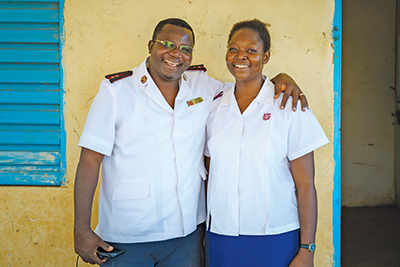 Self-denial is one of the primary principles of Christianity. Often,we think that self-denial is simply a sacrifice of material and financial goods. But it is much more than that—it is about surrendering into the hands of God; accepting to be broken down; being the instrument to express the will of God; refusing a life focused only on yourself; accepting to serve our neighbours without expecting anything in return; and the refusal to be led by any other thought than that of Christ.—Captain Nana Fatouma Togo, regional secretary for women’s ministries, with Captain André Togo
Self-denial is one of the primary principles of Christianity. Often,we think that self-denial is simply a sacrifice of material and financial goods. But it is much more than that—it is about surrendering into the hands of God; accepting to be broken down; being the instrument to express the will of God; refusing a life focused only on yourself; accepting to serve our neighbours without expecting anything in return; and the refusal to be led by any other thought than that of Christ.—Captain Nana Fatouma Togo, regional secretary for women’s ministries, with Captain André Togo
Malawi Territory
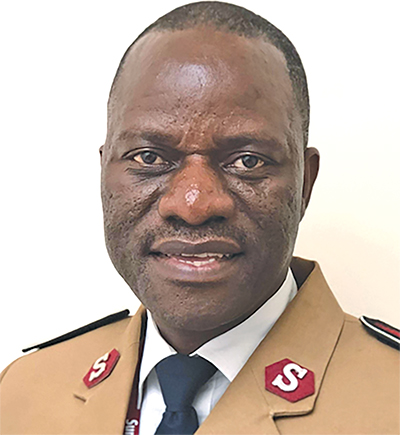 Self-denial means different things to different people. But when I think of self-denial, I refer to Colossians3:3-4: “For you died, and your life is now hidden with Christ in God.When Christ, who is your life, appears, then you also will appear with him in glory.” For me, denying yourself means recognizing Jesus Christ as your true centre of existence, rather than yourself. It is the basis for Christian fellowship and service; we are called to sacrifice resources like money, time, crops, privileges and even life, for the sake of Christ. The Lord himself exemplified self-denial, as seen in John13:1-17, when Jesus washes the disciples’ feet. Self-denial requires prayer, fasting and giving to the needy, as Jesus did. It requires living modestly, not in luxury.—Colonel Alfred Banda, territorial commander
Self-denial means different things to different people. But when I think of self-denial, I refer to Colossians3:3-4: “For you died, and your life is now hidden with Christ in God.When Christ, who is your life, appears, then you also will appear with him in glory.” For me, denying yourself means recognizing Jesus Christ as your true centre of existence, rather than yourself. It is the basis for Christian fellowship and service; we are called to sacrifice resources like money, time, crops, privileges and even life, for the sake of Christ. The Lord himself exemplified self-denial, as seen in John13:1-17, when Jesus washes the disciples’ feet. Self-denial requires prayer, fasting and giving to the needy, as Jesus did. It requires living modestly, not in luxury.—Colonel Alfred Banda, territorial commander
Bangladesh Command
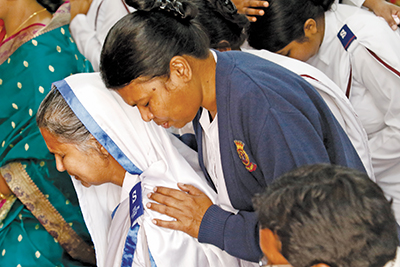 In the Christian faith, Jesus is often mentioned as a positive example of self-denial, both in the deeds he performed during his life as well as the sacrifices attributed to his death. To me, self-denial means denying myself and sacrificing my own desires or interests to put the needs of others first. This means being unselfish, turning away from evil and living by the Spirit’s power. Thus, Jesus said, “Whoever wants to be my disciple must deny themselves and take up their cross daily and follow me” (Luke 9:23).—Major Sara Bapari, program officer (right)
In the Christian faith, Jesus is often mentioned as a positive example of self-denial, both in the deeds he performed during his life as well as the sacrifices attributed to his death. To me, self-denial means denying myself and sacrificing my own desires or interests to put the needs of others first. This means being unselfish, turning away from evil and living by the Spirit’s power. Thus, Jesus said, “Whoever wants to be my disciple must deny themselves and take up their cross daily and follow me” (Luke 9:23).—Major Sara Bapari, program officer (right)
Mozambique Territory
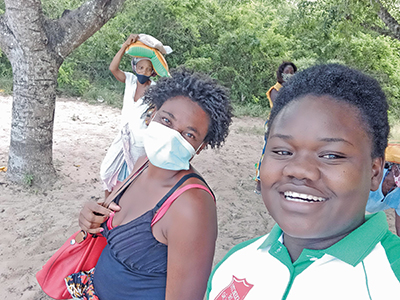 When I think of self-denial, I look to Philippians 2:5-8: “In your relationships with one another, have the same mindset as Christ Jesus … he humbled himself by becoming obedient to death—even death on a cross!” For me, self-denial is an expression of Christ’s call to human obedience. This appeal should not be observed as an obligation or yearly tradition, but an act of spiritual growth, evidence of our deep obedience, and a time where we imitate our mentor, Jesus.—Lieutenant Delfina Zualo, project officer (right)
When I think of self-denial, I look to Philippians 2:5-8: “In your relationships with one another, have the same mindset as Christ Jesus … he humbled himself by becoming obedient to death—even death on a cross!” For me, self-denial is an expression of Christ’s call to human obedience. This appeal should not be observed as an obligation or yearly tradition, but an act of spiritual growth, evidence of our deep obedience, and a time where we imitate our mentor, Jesus.—Lieutenant Delfina Zualo, project officer (right)
The Self-Denial Campaign is a time for giving, sacrificing and rallying together to make a difference. Without the assistanceof our friends and supporters worldwide, The Salvation Army would not be able to provide essential services in some countries where the need is great. What are you doing today to deny yourself? To learn more about the Self-Denial Campaign, visit salvationist.ca/PIM.
Kathy Nguyen is the resource/media co-ordinator in the international development department.
This story is from:




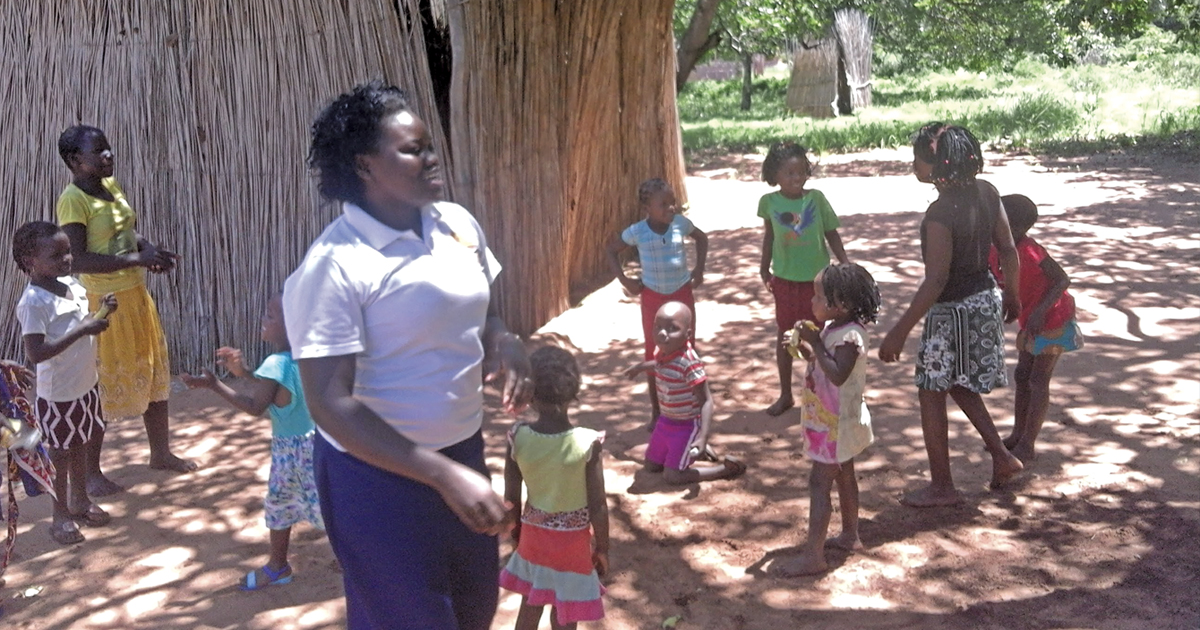





Very Inspiring Message about Self Denial.Thank you all officers for sharing their experiences.May Lord bless you and your Ministry